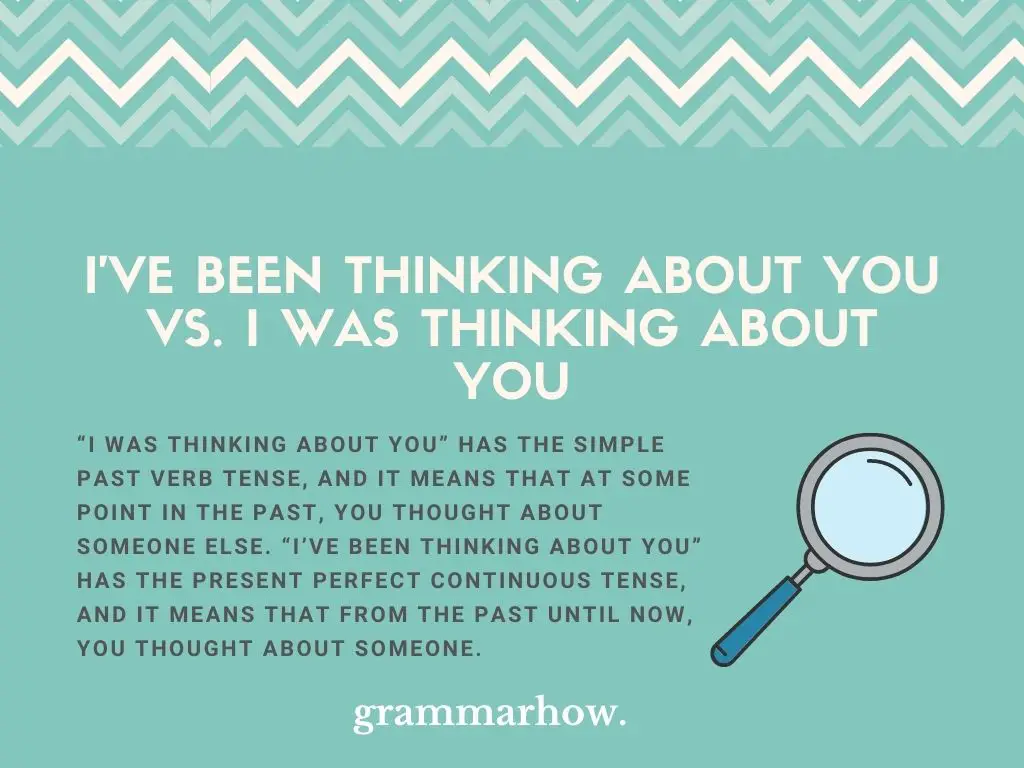Sometimes you’ll want to express that you thought about someone else in the English language. But is it the same to say “I’ve been thinking about you” and “I was thinking about you”? Or is there nuance in the ways that they are used? This article will clarify those questions.
I’ve Been Thinking About You vs. I Was Thinking About You
“I was thinking about you” has the simple past verb tense, and it means that at some point in the past, you thought about someone else. “I’ve been thinking about you” has the present perfect continuous tense, and it means that from the past until now, you thought about someone.

It’s easy to get confused at what the difference is between both of these verb tenses. Simple past describes something that happened in the past. It simply happened in the past, and stopped happening.
Present perfect continuous describes something that started in the past, but is still happening in the present moment, so it has not yet ended.
“I’ve been thinking about you” and “I was thinking about you” are not interchangeable, because their contexts are different enough to change the meaning of whatever sentence they’re used in.
I’ve Been Thinking About You
“I’ve been thinking about you” is a phrase that means that in the past, you started thinking about the person, and that in the present moment you still haven’t stopped thinking about them.
Understanding the meaning of the present perfect continuous form is, then, very important to comprehending what “I’ve been thinking about you” means.
The core of the phrase is that when you use “I’ve been thinking about you”, you’re saying that you still haven’t stopped thinking about the person.
Here are a few example sentences that include “I’ve been thinking about you in them”:
- I’ve been thinking about you, and I think I know what I can do to help improve your image.
- I’ve been thinking about you, and about us, and I think we have to improve our relationship.
- I’ve been thinking about you all of this time, and I don’t think I can ever go back.
- The truth is that during this extended break, I’ve been thinking about you and nothing else.
- I’ve been thinking about you, and I finally figured out what your issue is that we can help fix.
I Was Thinking About You
“I was thinking about you” is a phrase in the past tense, and the meaning of it is that at some point in the past, you thought about the person who you’re talking to. This thought might have lasted just a short little while, and it has to have ended.
When you use “I was thinking about you”, the subtextual implication is that you are not, in the present moment, still thinking about the person in question.
Simple past is one of the least complex verb tenses, and is one of the first ones that new English speakers learn. “I was thinking about you” is, therefore, a sentence most people could understand.
Here are a few example sentences that showcase how to use “I was thinking about you”:
- I was thinking about you the other day when I watched the latest Tom Cruise action movie.
- I was thinking about you as I pulled into our usual parking spot at the office building downtown.
- When I drew this extremely complicated and intricate painting, I was thinking about you.
- I was thinking about you as I went to bed the other night, content and melancholic.
- I was thinking about you and your affinity for red velvet cake the other day as I had dessert.
Which Phrase Is Used The Most?
According to information provided by the Google Ngram Viewer, “been thinking about you” gets significantly more use than “was thinking about you” since the year 1900, and at no point in history has this changed.

That being said, both “been thinking about you” and “was thinking about you” have had significant spikes in use, starting around the middle of the 1970s, and culminating in the year 2016.
Final Thoughts
Both “I’ve been thinking about you” and “I was thinking about you” are valid, accurate sentences. The former means that the thought of you hasn’t stopped yet, and the latter means that the thought in question started and ended before this current conversation.
You may also like: “Think Of” vs “Think About” – Here’s The Difference (+14 Examples)

Martin holds a Master’s degree in Finance and International Business. He has six years of experience in professional communication with clients, executives, and colleagues. Furthermore, he has teaching experience from Aarhus University. Martin has been featured as an expert in communication and teaching on Forbes and Shopify. Read more about Martin here.
